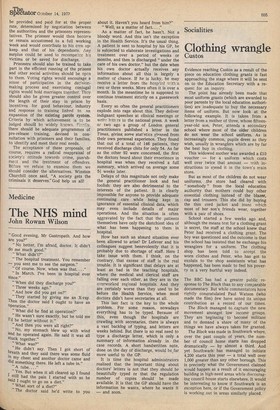Socialities
Clothing wrangle custos
Evidence reaching Custos as a result of the piece on education clothing grants is fast approaching the stage where it will be sent on to the Education Secretary with a request for an inquiry.
The point has already been made that most uniform grants (which are awarded to poor parents by the local education authori ties) are inadequate to buy the necessary items of uniform. But now look at the following example. It is taken from a letter from a mother of three, whose fifteenyear-old son, Peter, attends a secondary school where most of the older children do not wear the school uniform. As is increasingly common, pupils dress as they wish, usually in wranglers which are by far the best buy in clothing.
This widowed mother was awarded a E10 voucher — for a uniform which costs well over twice that amount — xvith instructions to spend it in the town's train store.
But as most of the children do not wear uniforms, the store had cleared with " somebody " from the local education authority that mothers could buy other essential clothing instead of the blazer, cap and trousers. This she did by buying the thin cord jacket and jeans which most of her son's friends wear, together with a pair of shoes.
School started a few weeks ago and, although the means test for a clothing grant is secret, the staff at the school knew that Peter had received a clothing grant. The boy was questioned and the outcome is that the school has insisted that he exchange his wranglers for a uniform. The clothing shop has been told to accept the worn clothes and Peter, who has got to explain to the shop assistants what has happened, has been made to feel his poverty in a very hurtful way indeed.
The BBC has had a greater public response to The Block than to any comparable documentary. But while commentators have rightly congratulated Paul Watson (who made the film) few have noted its unique contribution as a record of our times.
The Block managed to capture the new movement amongst low income groups. They are beginning to become militant and to demand a share of many of the things we have always taken for granted.
The Block was made in Southwark where, over the past couple of years, the number of council home starts has dropped dramatically — by almost a third. And yet Southwark has managed to initiate 4,200 starts this year — a total well over 1,000 greater than any other borough. This is precisely what the Government claimed would happen as a result of it encouraging building in high-need areas while discouraging council house starts elsewhere. It would be interesting to know if Southwark is an exception here, or if the Government policy is working out in areas similarly placed.














































 Previous page
Previous page